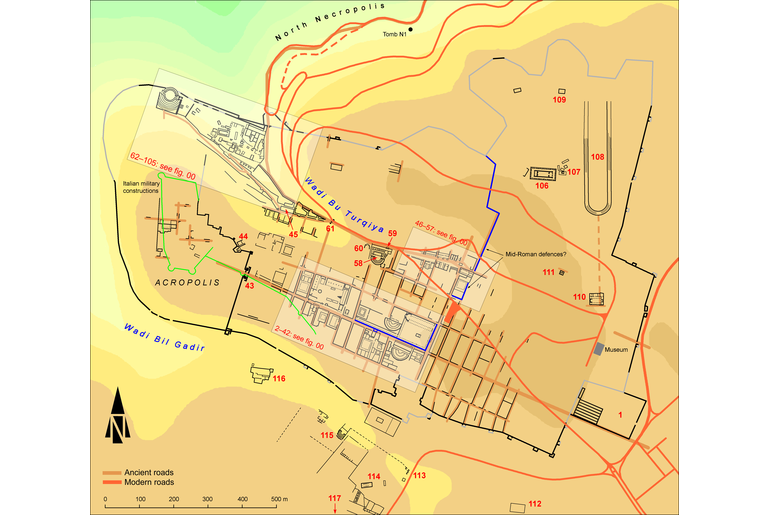Probably epitaph
IGCyr000100
Trismegistos ID: 738094
Source Description
Repository
Cyrene Museum, inv. number unknown.
Support
Fragmentary limestone stele broken on all sides except the left rim (0.33; 0.45;0.20).
Layout
Inscribed boustrophedon on the front face.
Letters
0.07; archaic shape of letters: three-stroke iota with right angles, rounded pi, three-stroke gamma combining classical and isosceles forms.
Place of Origin
Possibly Cyrene pleiades; HGL , West Necropolis .
Date
End of seventh or beginning of sixth century B.C. (lettering)
Findspot
Found in 1964 at Cyrene pleiades; HGL : on the South bank of the Wadi Bel Ghadir , at the Eastern end of the West necropolis .
Last recorded Location
Last seen by C. Dobias-Lalou in 2010 in Shahat : Cyrene Museum .
Text constituted from
Transcription from stone (CDL).
Bibliography
Dobias-Lalou-Mohamed, 1995 Dobias-Lalou, C., Mohamed F.A., 1995, A funerary inscription in archaic script from Cyrene, Libya Antiqua (LibAnt)n.s. 1, 55-59 - see in bibliography , whence SEG Supplementum Epigraphicum Graecum, Leiden, then Amsterdam, 1923-1971, then 1979- - see in bibliography , 45.2170. Cf. Gasperini, 2009 Gasperini, L., 2009, Ancora sulla più antica epigrafe officinale di Cirene, in C. Braidotti, E. Dettori, E. Lanzillotta (eds.), Ou pân efémeron: Scritti in memoria di Roberto Pretagostini, Roma, 1041-1050 - see in bibliography and Dobias-Lalou, Bulletin Épigraphique Dobias-Lalou, C.Bulletin Épigraphique in Études Grecques (REG)1987- - see in bibliography , 2011.650, whence SEG Supplementum Epigraphicum Graecum, Leiden, then Amsterdam, 1923-1971, then 1979- - see in bibliography , 59.1912; Dobias-Lalou, 2015 Dobias-Lalou, C., 2015, Les débuts de l'écriture en Cyrénaïque, in A. Inglese, Epigrammata 3. Saper scrivere nel Mediterraneo antico. Esiti di scrittura fra VI e IV sec. a.C., in ricordo di Mario Luni. Atti del convegno di Roma, 7-8 Novembre 2014, Tivoli, 59-80, 315-321 - see in bibliography ; Marengo, 2016 Marengo, S.M., 2016, Scoperte epigrafiche a Cirene, in Rizzo, M.A., Macerata e l'archeologia in Libia. 45 anni di ricerche dell'Ateneo maceratese. Atti del Convegno Macerata, 18 marzo 2014, Monografie di archeologia libica40, Roma, 161-170 - see in bibliography , p. 163-164.
Text
Apparatus
5 θυγ[ατ] (a form of θυγάτηρ or of a related word beginning with θυγατρ-)
French translation
Intraduisibile (voir commentaire).
English translation
Not usefully translatable (see commentary).
Italian translation
Intraducibile (vedi commento).
Arabic translation
غير قابل للترجمه بشكل جيد
Commentary
L. 1 either a compound adjective or a personal name including the word τιμά 'honour'.
Ll. 2-3 either τοὶ πρόγονοι or το͂ι προγόνōι, with the word for 'forefather'.
Ll. 3-4 the lacuna hides probably a proper-name, followed by a patronym: το͂ι Πρό|ϙλō: 'son of Proklos'.
With πρόγονος and θυγά[τηρ] ('daughter' or a related word), a funerary interpretation of the text seems to be the most plausible. The exact meaning of punctuation is not determinable and does not help to understand how a forefather, Proklos and a possible daughter are related. The incomplete word at line 5 might also have been a derived noun, meaning 'son of the daughter, grandson'. However the word corresponding to Attic and koine ἀδελφιδοῦς is not attested in other dialects and it would be hazardous to restore its supposed dialectal form.
Gasperini, 2009 Gasperini, L., 2009, Ancora sulla più antica epigrafe officinale di Cirene, in C. Braidotti, E. Dettori, E. Lanzillotta (eds.), Ou pân efémeron: Scritti in memoria di Roberto Pretagostini, Roma, 1041-1050 - see in bibliography rightly points out that there are some doubts about the provenance of the stone. However, what remains leads anyway to a funerary topic.
Creative Commons Attributions-NonCommercial 4.0 International License.
All citation, reuse or distribution of this work must contain a link back to DOI: http://doi.org/10.6092/UNIBO/IGCYRGVCYR and the filename (IGCyr000000 or GVCyr000), as well as the year of consultation.
